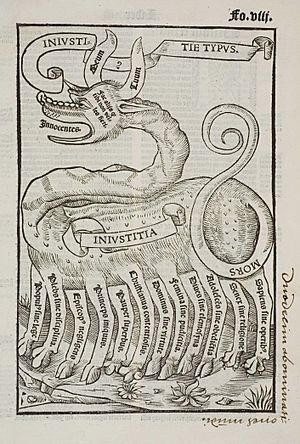Injustice facts for kids

Injustice is about things that are unfair or outcomes that people don't deserve. It can be about a single event or a bigger situation where things are generally unfair. In many ways, injustice is seen as the opposite of justice, which means fairness.
Feeling that something is unjust is a common human experience, even though what one culture considers unfair might be different in another. While natural events can sometimes feel unfair, injustice usually comes from human actions. This includes things like misuse, harm, ignoring problems, or bad actions that are not fixed or are even allowed by a legal system or other people.
The feeling of injustice can be a strong reason for people to act. It makes them want to defend themselves and others who they believe are being treated unfairly. When unfairness happens often within laws or society, it's sometimes called a two-tiered system. This means there are different rules or treatments for different groups of people.
Contents
What is Injustice?
Many thinkers have spent a lot of time talking about 'justice' (fairness). But historical stories and books often show examples of injustice much more than justice.
Some people believe that justice and injustice are like two sides of the same coin. They think that injustice is simply when justice is missing. However, other experts believe that justice and injustice are separate ideas. They argue that you can make a situation more fair without necessarily making it less unfair. Some even suggest that increasing fairness might sometimes even increase unfairness in other ways.
A common idea among writers is that injustice is the more basic feeling. They say that while it's hard to define justice directly, it's easy for everyone to see and feel injustice. The ancient Greek thinker Heraclitus was one of the first to say that injustice is the main quality. Many others, like Aristotle, have agreed with this idea over the centuries.
The Feeling of Injustice
Experts have studied how people feel about injustice around the world and throughout history. They found that the feeling of injustice is a human universal. This means it's something all people experience.
These experts also say that the feeling of injustice is a very powerful reason to act. Unlike the idea of justice, which often makes people think, the feeling of injustice often makes them want to do something.
One idea is that, for evolutionary reasons, humans who see others being treated unfairly can react as if they themselves were being attacked. This can cause an immediate "fight or flight" response. As civil rights movement leader Martin Luther King Jr. wrote in 1963, "injustice anywhere is a threat to justice everywhere." This means that unfairness in one place can harm fairness everywhere. Studies have even shown that babies can sense injustice and don't like it, even when it doesn't affect them directly.
Lawyers often learn how to make a jury feel a sense of injustice. They do this best by talking about specific unfair situations, not just general ideas. Some experts say that people often put up with being treated badly for a long time because they think it's unavoidable. This means their sense of injustice isn't strong enough to make them act. However, a widely shared feeling of injustice is a key reason for people to rebel or demand change. This strong feeling of injustice can be necessary to protect those who are weak or suffering.
What Causes Injustice?
A common reason for injustice is when people are selfish. As the ancient Greek philosopher Plato wrote, people will often act unfairly if they think it will benefit them. Plato also said that the worst kind of injustice is when someone acts unfairly but is still seen as fair by others.
Human injustice isn't always caused by trying to gain an unfair advantage or by being mean. It can also simply be the result of mistakes people make when deciding things. For example, studies have shown that judges on review boards are less likely to make decisions that help people if it's been a long time since the judges had a food break. This is sometimes called the "hungry judge effect." When rules are misused or abused in a specific case, it can show a bigger problem in how fairness is handled.
Examples of Injustice
Sometimes, people are found guilty of something they didn't do. The Innocence Project is an organization that works to free people who have been wrongly convicted in the U.S. legal system. They have many examples of cases where mistakes led to unfair outcomes.
Injustice in Movies and TV
Many movies and TV shows tell stories about people facing unfair situations or being wrongly accused. These stories often highlight the challenges of fighting against injustice.
- The Life of Emile Zola (1937), about a writer who spoke out against an unfair trial.
- Beyond Reasonable Doubt (1982), about a person wrongly found guilty.
- The Thin Blue Line (1988), about a person wrongly found guilty.
- In the Name of the Father (1993), about a family wrongly accused of a crime.
- The Fugitive (1993), about a doctor wrongly accused of a crime.
- The Crucible (1996), about unfair trials during the Salem witchcraft trials.
- The Hurricane (1999), about a boxer wrongly found guilty.
- Making a Murderer (2015), a TV series about a person wrongly found guilty.
See also
 In Spanish: Injusticia para niños
In Spanish: Injusticia para niños
 | Stephanie Wilson |
 | Charles Bolden |
 | Ronald McNair |
 | Frederick D. Gregory |


